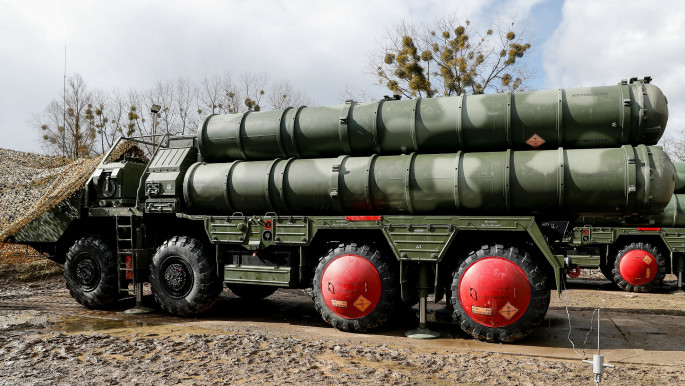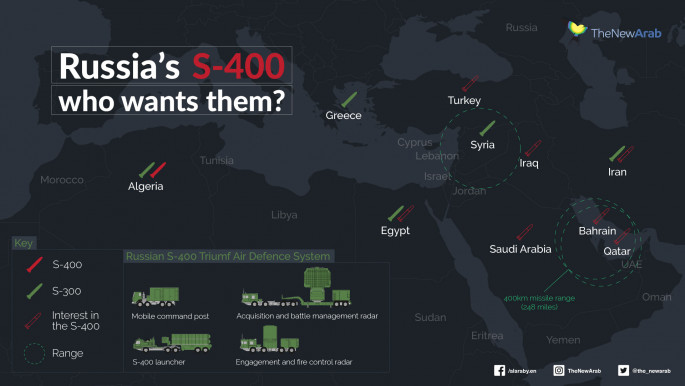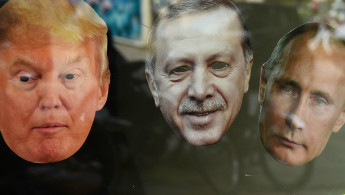How will the S-400 vs F-35 saga between Turkey and the USA end?
Air shipments are expected to continue until July 23, while extra sea-shipments carrying the missiles of the S-400 are expected to follow later.
Meanwhile, Washington has decided to punish Turkey by removing it from the stealth fifth general world leading F-35 fighter production programme.
On July 17, the White House issued a statement confirming the step. The Pentagon held a rare on-camera press conference, in which the Assistant Secretary of Defence for Procurement and Technology, and the Deputy Assistant Secretary of Defence for Politics, explained the details of the process of getting Turkey out of the F-35 fighter production programme and the future steps that will follow.
Commenting on the US decision, the Turkish government considered "the unilateral step unfair", "incompatible with the spirit of the alliance", and is "not based on any legitimate justification".
The Foreign ministry called on the NATO ally to reverse that decision, warning that "it will cause irreparable damage to our strategic ties".
 |
|
| Read also: US-Turkey tensions reach boiling point over Russia rocket saga |
Following the statement, Erdogan's spokesman Ibrahim Kalin phoned the White House national security adviser John Bolton, to further stress on Ankara's position in this matter.
Turkey lacks an independent strategic missile defence system which makes it vulnerable against the arsenal of ballistic missiles weapons possessed by many of its neighbours including Iran, Syria, and Iraq.
As a NATO member, the country depends on the alliance to compensate, however, the already existing NATO systems don't provide full protection to the entire geographical territory of the country which makes the need for an independent long-range missile defence system indispensable.
Why Turkey chose a Russian system?
In the last few years, Ankara asked the US to provide it with Patriot missiles several times but Washington constantly rejected the Turkish request. Turkish officials believe that this behaviour was designed to keep the country hostage to US policies.
Following the military involvement of Russia in Syria in 2015, Moscow's fighter-jets violated Turkey's sovereignty several times ultimately forcing the Turkish air force to shoot down one of the Russian fighter-jets in a first confrontation of its kind between a NATO member and Russia in 60 years.
Not only the US-led NATO showed lack of willingness and commitment to counter Moscow and defend Ankara at that point, but also Washington undermined Turkey's position vis-e-vis Russia by pulling out its patriot missiles batteries from the country and accusing Ankara of being "overreacted to a minor violation to its airspace" leaving Turkey more vulnerable than ever to Russia's threats.
These developments convinced Ankara that it can't count on the alliance with the US when things get serious in its backyard.
Washington's decision to overlook – for its own interest with both states – the overwhelming military intervention of Iran and Russia in Syria on behalf of Assad, and to choose to be allied with a designated terrorist organisation in Syria (PKK-PYD-YPJ) against Turkey's national security priorities and regional interests made things more complicated.
Furthermore, on 15 of July 2016, the US failed to swiftly support the legitimate government in Turkey during the failed coup attempt.
The US-made F-16s were used by the Junta to bomb Turkey's sovereign institutions including the Parliament and the military installation. At least two of the F-16s came very close of downing the presidential plane that night. Ankara had no independent and effective missile defense system to stop these F-16s.
Since Washington was still not willing to provide Ankara with the Patriot, it is then when Turkey decided to go forward and ask Russia for the S-400 system.
To secure a defence missile system that meets its needs and also to neutralise the Russian threat, Turkey decided to become closer to Moscow. To its surprise, Russia expressed its willingness to provide Turkey with the S-400.
Talks over the S-400 systems between Ankara and Moscow commenced in November 2016. Eight months later, both sides signed an agreement regarding the procurement of the S-400s.
 |
|
US decision makers never took the Turkish will to look elsewhere for a missile defence system seriously and considered the Turkish threats as a bluff. They also believed that Russia would never sell its triumph missile defence system to Turkey.
It is until this has become a reality that Washington realised what is going on and expressed its willingness to discuss a patriot offer. The offer, however, didn't meet Turkey's requirements.
How valid are the US concerns?
The White House has made it clear that it is impossible for Turkey to have both the F-35 with the Russian S-400 because the two systems cannot co-exist.
 |
|
| Read also: Turkey three years after the failed coup attempt: leaner army, more assertive foreign policy |
One of the main arguments about this particular point is that the Russian system allows Moscow to obtain intelligence information on the most advanced fifth generation multi-role fighter in the world. According to Pentagon officials this would jeopardise the production programme of the fighter, hence the desire to protect it in the long run.
The Turkish government however, believes that these claims are invalid and are used to pressure Turkey to drop the Russian system without offering a viable alternative.
Yusuf Erim, a Turkish analyst, told The New Arab that the "US concerns in this regard are not plausible because Ankara has made a very strong effort to address the US concerns."
He added, "Turkey has been willing to create a working group of technical experts from both sides and even from NATO, but Washington ignored the Turkish initiative and blocked all the efforts to address this matter which indicates the problem is much more political than it is technical."
According to estimates, Ankara's forced exit from F-35 production programme might cost the country around nine billion dollars.
Furthermore, Turkey's defence industry companies are set to lose a valuable opportunity to further develop and increase its business. Most importantly, Ankara will not receive its F-35 orders which will definitely deny it air superiority when it comes to losing the most modern and complicated 5th generation stealth fighter in the world.
On the other hand, Turkey's removal from the F-35 production programme will also impose costs on the US.
Although Washington tried to underestimate the importance of these costs, the price of the fighter jet is expected to rise along with delays in the delivery of the of the jets that are already requested by the allied countries.
In this sense, it is estimated that the removal of Ankara could cost Washington half a billion to 600 million dollars, the delivery of 50 to 75 fighter jets will have to be delayed over two years, not to mention the time needed to fill the gap that Ankara will leave, fully substitute its contribution, and find another buyer for the 100 F-35 Turkish order, if any.
What next?
The US president stroked a conciliatory tone over S-400 missile system purchase earlier when he said that Turkey had been "treated very unfairly".
Following kicking Turkey out of the F-35 production programme, the White House reiterated the importance of the strategic relationship with Turkey, stressing that "as NATO Allies, our relationship is multi-layered, and not solely focused on the F-35. Our military-to-military relationship is strong, and we will continue to cooperate with Turkey extensively, mindful of constraints due to the presence of the S-400 system in Turkey".
The personal position of the US president on the F-35 vs S-400 issue reflects a mind of understanding for the difficult position. Although he is probably trying to contain the conflict, whether he will be able to block sanctions under the Countering America's Adversaries Through Sanctions Act in the future or not remains questionable. However, the fact that there are not further sanctions now on Turkey means that Washington will likely keep the door open for possible resolution.
In this regard, it is worth nothing that there are three points which support such suggestion.
First, Trump announced that he's not looking at Turkey sanctions "right now" and authorities in the US released former Turkish banking executive Hakan Atilla signalling the desire to contain the conflict and not let it spill out to the NATO alliance or the bilateral cooperation in other issues.
Secondly, US officials repeatedly used the term "suspension" to describe Turkey's status in the F-35 production programme in the Pentagon on-camera press conference.
Thirdly, Washington announced that the process of kicking Turkey fully out of the programme will be completed by the end of March 2020, which intersects with the date of the deployment of the S-400 in full form in April next year according to previous statements by Turkey's Recep Tayyip Erdogan. This will probably spare more time to the two parties to sort it out – if possible.
While transferring the S-400 to a third party can be a possible solution, it is hard to imagine it happening, not to add that such option would essentially require Russia's green light.
One likely solution might be unpacking the S-400 or deploying it under certain guarantees in return for receiving the F-35s later.
Turkish decision makers might accept soft sanctions if this would lead to a solution later, however, US contradictory policies with Turkey in Syria, Iraq, and elsewhere is expected to complicate the issue, thus making the chances of resolving the S-400 vs F-35 conflict very slim.
Depriving Ankara from the F-35 and imposing strong sanctions against it will cause irreparable damage to US- Turkey relations and will directly play into the hands of Russia.
By doing this the US will be forcibly pushing Turkey more towards Moscow's embrace. During the last few years, Russia – for its own calculations and interests – expressed its willingness to offer Turkey what Ankara's NATO allies are declining to sell.
The S-400 story began when Washington rejected to sell Turkey the patriots. Following Turkey's forced exit from the F-35 programme, Russia expressed its readiness to sell its super-maneuverable Sukhoi Su-35 fighter jets to Ankara.
Although, Turkish decision makers will not rush into this option, the fact that the indigenous FT-X national fighter jet project will take years to be realised, Ankara's options will most probably be limited to European fighter jets and the most advanced Russian Su-35.
The latter option will solely depend on Washington's next step and might have greater geopolitical implications if US continues in its current path to rebuff Turkey.
Ali Bakeer is an Ankara based political analyst/researcher. He holds a PhD in political science and international relations. His interests include Middle East politics with a particular focus on Iran, GCC countries and Turkey.
Follow him on Twitter: @alibakeer



